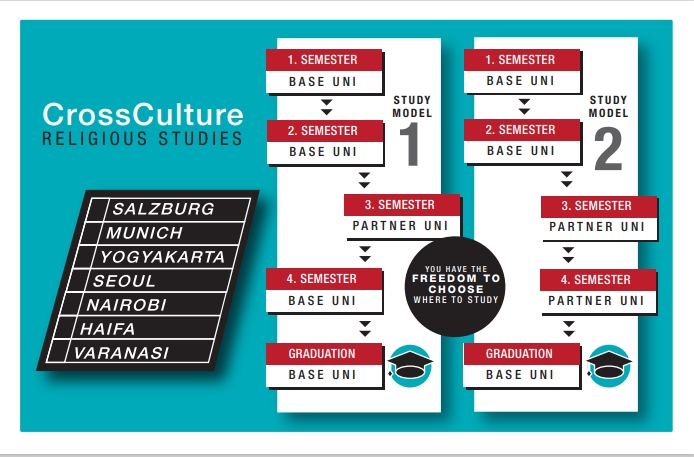The vision of the Master`s program is a cooperative one, in which a number of universities participate. Students will spend their first academic year (two semesters) in a religious studies program at one of the participating universities. Their third semester will be spent at another university, for an immersion in a different cultural environment, studying with scholars of expertise in a religious tradition other than the one to which the first year was devoted. Students may choose to spend their fourth semester at any participating university, including those at which they studied over the previous semesters. All base universities guarantee full mutual recognition of academic credits gained at the other participating institutions. The degree will be granted by the university at which the student spent their first year of study.
Every year all participating students and academic staff will be welcomed at the beginning of August to join the CROSSCULTURE Religious Studies Summer School 2025 in Salzburg to share their experiences, and to study with the professors from the six universities, and to deepen their own intercultural and interreligious relations. Attending the Summer School will also allow students to take advantage of the famous annual ‘Salzburger Hochschulwochen’, which will be in progress. Also, students will enjoy all the benefits of the annual University of Salzburg Summer School, with which our program will be fully coordinated, and which offers a rich cultural program featuring special concerts, student events, and tours.
Universities participating in the Crossculture Religious Studies Project Program include:
-
The Faculty of Catholic Theology in Salzburg, Austria, for Religious Studies, Theology and with a focus on Contemporary Religion and Spirituality;
-
The College of Buddhism, Dongguk University Seoul, South Korea, focusing on Buddhist history and thought;
-
The University of Nairobi, Kenya, with a focus on African Religions & Intercultural Philosophies;
-
The University Haifa, Israel, focusing on Jewish Studies and Theology;
-
The Munich School of Philosophy (HFPH) and the College of Interreligious Studies at the House of Cultures and Religions in Munich, Germany, with a focus on intercultural ethics and interfaith dialogue. HFPH does not serve as a base university, but offers the course “Ethics of intercultural dialogue;
-
The Gadjah Mada University Yogyakarta, Indonesia, with the Center for Religious and Cross-Cultural Studies (CRCS) focusing on Islam and other Indonesian Religions.
-
The Benares Hindu University, Department of Phiosophy and Religion (BHU) in Varanasi, India, focusing on Hinduism, Jainism, Religions in India.





